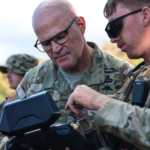
In this new monthly column, Defense Daily highlights individuals from across the government, industry and academia whose efforts contribute daily to national defense, from the program managers to the human resource leaders, to the engineers and logistics officers. Alison King serves as Vice President of Government Affairs at Forescout Technologies, where she is responsible for the company's relationships across Congress and the Executive Branch where she leads all legislative functions, partnerships, and policy efforts for the Federal Team. Previously, King…













